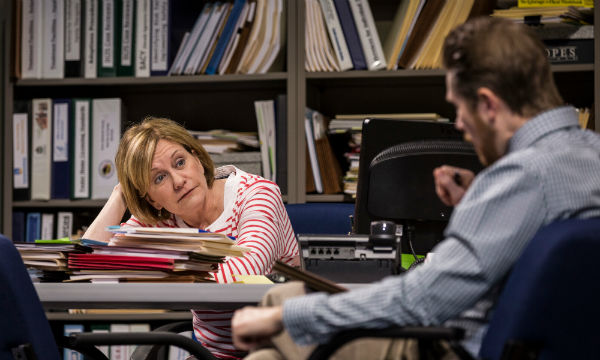The Goodman's Impassioned, Challenging 'Luna Gale'
By Melody Udell in Arts & Entertainment on Feb 5, 2014 9:20PM

Mary Beth Fisher (Caroline) and Erik Hellman (Cliff) in the world-premiere production of Luna Gale by Rebecca Gilman, directed by Robert Falls.
Playwright Rebecca Gilman sheds light on the moral complexities of the social service industry with her blazing new production, Luna Gale. The play exposes just a glimpse—a disturbing one—of the high-stakes situations that social workers find themselves in on a daily basis. Gilman layers the production with ethical gray areas—right versus wrong, gut feelings and internal prejudices are all challenged in this blistering, important new play.
An infant born to meth-addicted, teenage parents, Luna Gale is the one person in the play who must ultimately suffer the consequences of others’ decisions—whether they’re made by her clearly ill-equipped parents, her born-again grandmother with long-buried secrets, or the well-meaning but burned-out social worker whose passion and 25 years of experience can’t override a system that values a different set of results. But as Gilman eventually shows us, nothing in this long-suffering industry is ever truly predictable.
The play opens with a telling scene: Karlie and Peter (the parents, played by Reyna de Courcy and Colin Sphar) have taken a seriously dehydrated, diarrhea-stricken Luna to the ER, but her condition is so severe, the hospital staff is concerned enough to call in a social worker, Caroline (Mary Beth Fisher). It’s obvious to Caroline that the baby cannot go home with her clearly strung-out parents, so Caroline puts Luna in “kinship care” with Karlie’s mom, Cindy (Jordan Baker). Karlie and Peter agree to a slew of terms in order to get Luna back, including attending support groups and parental counseling. Both have also been put on the waitlist for rehab—and it’s maddening to learn that those who are willing to accept help can’t get it.

Playwright Rebecca Gilman and Mary Beth Fisher (Caroline) in rehearsal for 'Luna Gale.'
Gilman continues to layer the tension—between mother and daughter, social worker and, well, everyone—until it’s truly unclear what decisions will result in a caring, loving upbringing for Luna. Should she live with her sweet but obviously troubled young parents? Or with her grandmother, who is clearly willing to put her relationship with Jesus before the one with her own daughter? Or should Luna be given over to foster care, where even those who successfully “age out” can struggle once they’re no longer in the care of the state? That assumes, of course, that Luna would end up in a good foster care situation, which is so often not the case. But Caroline is blocked by more than unclear motives and feuding family members. Her arrogant, combative boss, Cliff (the slick Erik Hellman), seems eager to butt heads with her every decision, even though Caroline has been a practicing social worker longer than Cliff has even dipped his toe in this volatile workforce.
Todd Rosenthal’s revolving set transitions quickly from fluorescent-lit hospital waiting room to cluttered office to state-approved nursery. And like the characters at the center of Luna Gale, the audience is practically dizzy from their trip through their social welfare system—with Caroline at the center of it all. Fisher’s Caroline is fiery and bitter and flawed; each sentence is a battle between biting her tongue or fully exposing her rapidly escalating cynicism. And through her, Gilman is showing us a disturbingly subversive industry that can’t balance the welfare of a child with the needs of the state, no matter how well-meaning and hard-working its staff.
The show runs through Sunday, Feb. 23 at the Goodman, 170 N. Dearborn, tickets available via 312-443-3800 or online.